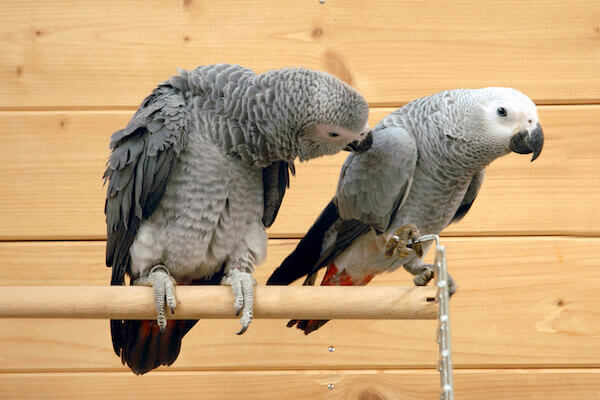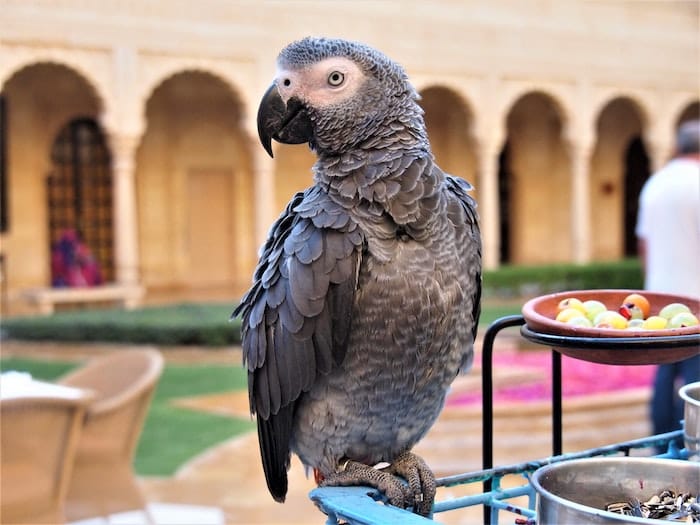Renowned for their striking appearance and remarkable intelligence, African Greys, native to the dense rainforests of central Africa, are one of the most popular pet parrots worldwide.
Known for their distinctive grey plumage with a hint of white around the eye and a vibrant red tail, they are a captivating sight to behold. However, their beauty is just part of the allure. African Greys are extraordinary talkers, capable of mimicking human speech and understanding complex commands, making them a fascinating species to study and nurture.

Lifespan of African Greys
The lifespan of African Greys is notably extensive, significantly outpacing many other pet species. On average, these majestic birds live between 40 to 60 years in captivity, with some well-cared-for individuals even reaching the ripe old age of 80.
This longevity is due to their robust health, proper diet, and stimulation provided by owners. It’s important to note that their long life expectancy necessitates a long-term commitment from their caretakers, who must be ready to provide them with the necessary care and companionship they need to thrive for potentially several decades.
Factors That Affect African Grey Lifespan
African Greys boast an impressively long lifespan, particularly when compared to other pet birds. In captivity, with proper care and nutrition, African Greys can live upwards of 50 to 60 years, with some even reaching the age of 70.
In the wild, their lifespan tends to be shorter, generally around 40 to 50 years, due to hazards such as predators, disease, and habitat destruction. These lifespans, however, are not a guarantee and can vary greatly depending on individual health, quality of care, and genetic factors.
Nonetheless, adopting or purchasing an African Grey Parrot entails a substantial time commitment, considering they could potentially be a lifelong companion.
Although, several factors can significantly influence the longevity of African Greys. Foremost among these are diet and nutrition. A well-balanced diet, rich in fresh fruits, vegetables, and bird-safe grains, can enhance their overall health and lifespan. Access to clean, fresh water is also critical.
Like any creature, African Greys require regular exercise to maintain their physical well-being. This means they need ample space to move and play. Mental stimulation, in the form of training, toys, and interaction with their human caregivers, contributes to their emotional health. It can help prevent stress and boredom, which can lead to harmful behaviors and health problems.
Regular veterinary check-ups are essential in detecting medical issues early and ensuring that your parrot remains in good health. Lastly, the environment in which they live can also have a profound impact. A clean, safe, and quiet environment can contribute to a longer, happier life for an African Grey.

Maintaining African Grey Parrot Health
A balanced diet plays a paramount role in preserving the health and vitality of an African Grey Parrot. Their nutritional needs are complex and require a wide array of foods to meet.
Primarily, their diet should consist of high-quality, bird-safe pellets, accounting for around 60% to 70% of their intake. Fresh fruits and vegetables should make up the remaining 30% to 40%, providing essential vitamins, minerals, and hydration. It’s important to offer a variety of fruits and vegetables, such as apples, bananas, broccoli, and leafy greens, to ensure all nutritional needs are met.
Occasionally, cooked grains and legumes can be added for variety and additional nutrients. Avoid feeding avocados, chocolate, and caffeine as they are toxic to birds. Remember, just like humans, each parrot is unique and may have individual dietary requirements. Thus, customized diet plans under a veterinarian’s guidance can help maintain optimal health and prolong life expectancy. Regular access to fresh water is also crucial for hydration and digestion.
On the other hand, exercise is another critical component in ensuring the longevity and health of an African Grey Parrot. These intelligent birds require both physical and mental stimulation to stay healthy. A sedentary lifestyle can lead to obesity, heart disease, and other health issues.
Incorporating regular exercise into your parrot’s routine can consist of free-flight time in a secure space, playing with toys, or engaging in bird-safe interactive games. This not only strengthens their muscles and cardiovascular system but also provides mental enrichment, reducing the risk of behavioral issues like feather-plucking or excessive squawking.
Additionally, exercise can help maintain a healthy weight, reducing the risk of obesity-related issues. Thus, creating an active, engaging environment is as important for an African Grey’s health as providing a balanced diet.
Regular Vet Check-ups
Regular vet check-ups are vital in maintaining an African Grey Parrot’s health. These check-ups not only detect potential health issues at their early stages but also ensure timely treatment, increasing the chances of a successful recovery.
During routine veterinary visits, the parrot’s weight, diet intake, and general behavior can be monitored to identify any changes. Veterinarians also utilize blood tests, x-rays, and other diagnostic tools to evaluate the bird’s internal health, including organ function and potential presence of parasites.
Furthermore, these visits can serve as an opportunity to discuss any concerns regarding the bird’s diet, exercise regime, and overall well-being. Therefore, establishing a regular vet check-up schedule is an indispensable part of caring for an African Grey Parrot’s health.
Preventive care is integral to extending the lifespan of an African Grey Parrot. This proactive approach involves regular vet check-ups, a balanced diet, and daily exercise, all aimed at maintaining optimum health and averting potential issues before they escalate.
Parrots receiving preventive care are less likely to suffer from obesity, heart disease, and other health conditions that can shorten their lifespan. Preventive care also includes mental stimulation, which keeps parrots engaged and less prone to stress-related behaviors that could impact their health. Behavioral enrichment can involve toys, puzzles, and social interaction, which are all crucial aspects of a parrot’s well-being.
Ultimately, preventive care aids in ensuring your African Grey Parrot leads a long, healthy, and fulfilled life.
Mental Health Importance
Just as with humans, mental health plays a significant role in the overall well-being and lifespan of African Grey Parrots. These birds are known for their high intelligence and need for mental stimulation. Without it, they can exhibit signs of stress, depression, and anxiety, which can manifest as destructive behaviors like feather plucking and self-harm.
Such psychological stress can compromise their immune system, making them susceptible to diseases and reducing their lifespan. Providing a mentally stimulating environment for your parrot, by introducing toys, puzzles, and interactive play, encourages critical thinking and problem-solving. This cognitive exercise not only keeps them mentally fit but also contributes to their emotional well-being, promoting longevity.
Hence, mental stimulation is a critical factor influencing the lifespan of African Grey Parrots. Here are some helpful tips for keeping African Grey Parrots mentally engaged and stimulated:
- Interactive Toys: Consider providing your parrot with a variety of toys that stimulate their mind. This could include puzzles, foraging toys, or even simple toys that make noise when interacted with. Rotating toys regularly can also keep the environment fresh and engaging.
- Training Sessions: Regular training sessions can be a great mental workout for an African Grey Parrot. You could teach them tricks, or even useful behaviors like stepping up onto your hand. Remember to always use positive reinforcement during training.
- Social Interaction: African Grey Parrots are social creatures and crave interaction. Spend time with your parrot each day, talking to them and including them in your activities. This can help keep them mentally stimulated and reduce feelings of loneliness or boredom.
- Bird-Safe Plants: Introducing safe, bird-friendly plants into their space can provide a natural and stimulating environment. This allows parrots to engage in natural behaviors like foraging.
- Varied Diet: Providing a varied diet that includes different types of fresh fruits, vegetables, and grains is not just good for their physical health but also provides mental stimulation. Foraging for different types of food can be an exciting challenge for these intelligent birds.
Just a reminder that every parrot is unique – what may work for one bird might not do the trick for another. Make sure to keep an eye on your parrot’s behavior and adjust their surroundings accordingly.
In conclusion, several factors contribute to the long lifespan of African Grey Parrots. First, a stimulating environment filled with a variety of toys keeps their minds active and engaged. Second, regular training sessions serve as a mental workout, fostering their intelligence. Third, daily social interaction satisfies their social nature and helps prevent boredom. Fourth, introducing bird-safe plants into their space allows them to engage in natural behaviors like foraging. Lastly, a varied diet, including fresh fruits, vegetables, and grains, maintains their physical health and provides mental stimulation. Keep in mind, that every parrot is unique, and these strategies should be adjusted based on their behaviors and needs.
